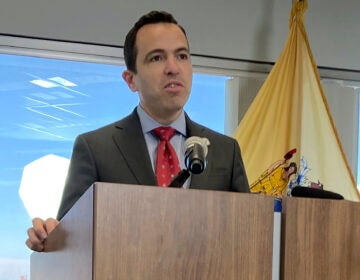New Jersey to reduce initial impact of student test scores on teachers

In a much-anticipated decision, Gov. Chris Christie yesterday compromised on New Jersey’s use of new national school standards and tests — but he didn’t compromise much.
Christie late yesterday put out dual announcements to address what was becoming a swirling debate in the state.
First, he announced an executive order creating a new state task force — entirely appointed by Christie – to study the effectiveness of state testing as a whole, including the upcoming PARCC (Partnership for Assessment of Readiness for College and Careers) tests and the Common Core State Standards that drive them.
In a second announcement, the governor said the state will also lessen the weight given the new PARCC tests in teacher evaluations for the next two years. Instead of the current 30 percent weight for affected teachers, it will reduced to 10 percent next year and 20 percent in 2016 – largely inconsequential amounts in terms of the overall criteria for the evaluation.
The moves appeased some critics on both sides of the political aisle, most notably the state’s dominant teachers union, the New Jersey Education Association. The union put out a statement taking credit for getting the governor to compromise.
Christie’s moves are also sure to halt a push in the state Legislature to delay the use of scores from the PARCC exams in teacher and school ratings for up to two years. A bill was up for final vote in the Senate, but now is unlikely to be posted, as state Senate President Steve Sweeney (D-Gloucester) was directly involved in the compromise talks.
But in the realm of national politics to which Christie is also playing as a possible 2016 presidential contender, the moves don’t move the governor very far from the pro-standards and pro-testing track first started under his former education commissioner, Chris Cerf, and now being carried forward by acting Commissioner David Hespe.
The new PARCC exams will still start next year, as planned, and there has been no backing off on the Common Core State Standards. In addition, the full use of state test scores in certain teacher evaluations will proceed as planned for the year just completed.
And even if the new task force recommends any radical changes, they will likely be at least a year away – after Christie decides on whether to run for the White House.
Christie’s administration yesterday sought to put the decision in more practical rather than philosophical terms.
Hespe said in an interview that the decision was meant to acknowledge that new PARCC testing will have its bumps and present challenges in New Jersey, and that a pause in using them to rate teachers made sense.
The state is not entirely dismissing the use of test scores in teacher ratings, he stressed, an important requirement under federal rules.
“We felt we could limit the use of the PARCC until we have a comfort level with the data that is obtained,” Hespe said yesterday.
“The first year of any new assessment will present some surprises,” he said, “and we believe we are being flexible and cognizant to those needs.”
In addition, Hespe said the state will add an appeal process for the current year around the use of so-called “student growth objectives,” a separate measure that uses assessments other than standardized test scores. The SGOs account for as much as 20 percent of a teacher’s rating.
“I see this more as a second look by the department,” Hespe said. “This will be a small number of teachers, but they can apply to us directly to see how they have been measured (by SGOs) and whether it has been done properly.”
The guessing over how and when Christie would move on the issue increased over the last several weeks, especially as the Legislature proceeded with its own bill to delay the use of PARCC.
And it only intensified this past weekend when Christie announced at the National Governors’ Association conference in Tennessee that he would put forward a proposal to address the national Common Core debate in the next week.
A half-dozen states have dropped the PARCC tests in the last year, while others have hedged on the Common Core — with much of the opposition driven by conservative groups opposed to a federal role in education.
But in his announcement yesterday, Christie ended up sticking to his support of the Common Core and paying little heed to the polarizing arguments in other states over whether to drop out of Common Core and the PARCC entirely.
Christie’s compromise moves were not entirely surprising to some observers.
“I’d be shocked if he called for the state to pull out of the Common Core and PARCC,” said Patrick McGuinn, an associate professor of political science at Drew University who focuses on education policy.
“I certainly don’t think he’d kowtow to the Tea Party types,” he said. “It’s not politically smart, given they wouldn’t support him anyway.”
McGuinn said Christie appeared to be keeping himself in the Jeb Bush camp on education policy, alluding to the former Florida governor who has similar views on education and is a potential challenger for the moderate vote of the party.
Still, the decision was hardly universally embraced.
The grassroots pro-public school group Save Our Schools NJ, which had been leading much of the protest, put out a statement yesterday questioning the motives for the decision. It said it still supports the Senate and Assembly bills that would have led to a more meaningful review process. It questioned the makeup of the new task force and the likely outcome of its work, among other issues.
“The Governor’s Executive Order does not delay accountability for students, teachers or public schools,” read the statement. “As Save Our Schools NJ has maintained all along, we want the Senate to vote on (on the bills) so that the voters can hold the Legislature and the Governor accountable.”
On the other end of the political spectrum, the head of the state’s chapter of the Eagle Forum, a conservative group, said the governor caved in to political pressures.
“Governor Christie’s Executive Order isn’t worth the paper on which it’s printed!” read the statement from Carolee Adams, president of Eagle Forum NJ. “Pathetic! Slapped together! Only about a study commission regarding assessments, it does NOT address a comparison of current vs. Common Core Standards.”
“And, Christie wants to be President?!” she wrote.” Not on our watch, I pray!”
The comments from the political middle were more subdued. State Sen. Teresa Ruiz (D-Essex), chairman of the Senate’s education committee and involved in the negotiations, said the outcome was a good compromise to ensure the new tests are administered properly.
“I … want to thank the Governor, the Department of Education, and the teacher’s unions who worked with us on this compromise,” Ruiz wrote. “It shows what can happen when everyone comes to the table and is willing to work together.”
________________________________________
NJ Spotlight, an independent online news service on issues critical to New Jersey, makes its in-depth reporting available to NewsWorks.
WHYY is your source for fact-based, in-depth journalism and information. As a nonprofit organization, we rely on financial support from readers like you. Please give today.




